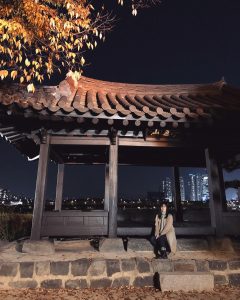Mary Chen
A soft tapping at my door is enough to wake me tonight, because it is raining and so I have been having bad dreams again. I think it is my night-owl landlord, finally come to inspect the leak in the living room, but when I unlatch the lock and ease it open, I come facetoface with my little sister. At first, I think I am seeing things.
But then. But then she tilts her head, smiling, in the way she used to do, and I know that this is really Katie. She is even wearing the same clothes as when I saw her last: pink mittens, hoop earrings, and the hand-me-down black coat I passed on to her two years before.
“Hi, Abby,” she says, and her voice is soft. She takes me into her arms, tightly, and presses her cold cheek to mine. She smells like rain and clean air. “I’ve missed you.”
I swallow, take my lip between my teeth and try to say something, want to say something, but I can’t.
◊ ◊ ◊
She lines up her shoes neatly by mine and hangs her jacket on the hook behind the door. I glance, but there are no rips in the cloth or stains dragging along the hem. She shuts the door and sinks down into my line of vision until all I’m seeing is her. Then she smiles.
“I picked up some takeout from that place you and Mom used to like,” she says. “Hon’s.”
I think she is joking. Hon’s closed down three years ago, the space it had occupied now a condominium. The two of us had even gone there on its final night to slurp noodles and buy T-shirts. But she holds up the plastic bags now, and when she hands them to me, they feel the same as I remember. Warm. Full.
“I hope you’re hungry,” she says.
I unknot the bags when we get to the kitchen while she goes digging in the cupboards for cups. Minced pork and century-egg congee, youtiao, chive dumplings. Egg-yolk buns. Steam curls up from the Styrofoam, and my stomach quivers.
“You used to walk down there every Saturday with Mom after Chinese class, while Dad took me to ballet, remember?” she says. She rinses out two mugs, then sets the kettle to boil. “So we would all have food to eat once I finished. But I would always be so jealous. Like—”
She stamps her feet on the ground and curls her face into a pout. “Mom! It’s not fair that jiejie gets to go with you! I want to go with you!”
She straightens up, mouth still kinked up in a smile. “Remember?”
I swallow past the aching in my throat and nod.
“Come on,” she says, and takes me by the hand. She leads us into my living room and we sit on the floor with the takeout boxes between us. She breaks apart my chopsticks for me and fills up my bowl, and I eat. The congee is thick and silky, each piece of century egg blooming with delicate snowflakes. My fingers grow slick with oil from the youtiao, and she laughs when I lick them.
I startle at the sound. It’s loud—boisterous. Like someone has told her a silly knock-knock joke or tickled her near the knees. She sounds happy.
She shrugs when she sees me staring. “It’s just good to see you eat again, Abby,” she says, and dips her dumpling in vinegar, red as cherries. Eats the whole thing in just one mouthful.
◊ ◊ ◊
I go digging through the hall closet as she brushes her teeth. There is too much clutter in here—enough that I could probably fold myself in and never be found.
I hear the tap run, and a moment later she pads over to where I am, floss between her teeth.
“You already threw away the air mattress,” she says. “Last March, right after the funeral.”
I pause in my rummaging, breath caught in my throat and one arm stuck in a bag full of her old Furbies. I don’t remember much of the funeral.
She twines the floss around her finger until her fingertip goes a little white. “It had a hole in it, remember?”
The memory slowly unfurls itself. It was a small hole—a pinprick, really, so small I hadn’t been able to see it, only feel for it with the skin of my palm. But it was enough that by morning I would always wake with my scalp pressed to the floor, the sound of Mom’s crying and Dad’s endless pacing floating up into me from their room below.
“I won’t be here for long, anyway,” she says. “Just a couple days.”
I stare at her.
“Oh, stop. Don’t look like that,” she says. She kneels down and picks out a tattered Furby from the bag. Nuzzles it against my cheek. “You’ll make me cry, too.”
◊ ◊ ◊
When we go to bed it begins to rain harder. I lie there, her next to me, listening to the sky break open and weep. From outside, the faint wail of an ambulance passing by filters in with the rain. I dig my fingers into the blankets. Ambulances can’t drive fast enough when it rains this hard.
“I can hear you replaying it all the way from here,” she murmurs. “Stop it.”
I reach for her and she lets me. I cradle her head in my palm, and I feel the crack. Where bone splits. I can almost feel her heartbeat through her skin.
She shifts away, and the moonlight spills across her face and shoulders, making her eyes take on a nacreous glow.
“And now you look like you’ve seen a ghost, Abigail.” Her lips tilt up in a bare-bones smile. “Boo.”
I turn away and I breathe in. Hold the air inside my lungs, let it rattle in the spaces. Breathe out. After a moment she presses herself against my back and touches her lips to my neck, my shoulder blade. Soon she’s wrapped her arms around me, fingers pressed gently against the softness of my belly. It’s the kind of winter night that bites—cold seeping in through the plaster walls and into our skins, but everywhere we’re touching, it’s warm.
◊ ◊ ◊
When I wake up, I’m alone. The bed is cold even where I’ve slept, like all the heat has leached down from my body through my sheets and to the floor.
I find her in the kitchen peeling a pomelo.
“Morning,” she says, then laughs. “Did you know you snored last night? That hasn’t happened in years.”
I cross the room in two quick steps and crush her into me, pressing my face into her neck. She drops the pomelo and holds me back, but my hands still shake. For a moment we stand just like this: me pressed against her, her pressed against the kitchen sink.
“What you need is a walk,” she says eventually. She smooths a hand down my hair. “When was the last time you went out just to walk? Or to see the lake?”
I shrug.
“See,” she says, very soft. “Too long.”
◊ ◊ ◊
Outside, the rain from last night has hardened into black ice, shiny and cold. She hangs onto my hand every time we pass through a patch, and scowls when the wind scratches at our faces and makes stray hairs fly behind us like kite strings. I squeeze her hand every time a car comes down the street beside us. We walk like this, hands locked together, squeezing over and again like heartbeats.
“This cold would even make a bear go crazy,” she grumbles. “Weren’t you going to finally move somewhere warm? Like Hawaiʻi. You—”
I don’t hear the rest of her sentence. It is swallowed up by the sound of a freight truck barrelling by, crunching frost beneath its heavy tires. My heart gallops and gallops, and I stop, squeeze my eyes shut.
She’s quiet for a while. “We’re almost there,” she coaxes a moment later. She tugs at my hand. “Just a bit more.”
But I am frozen to the cement. Ahead of us the crosswalk unfolds between streets, but all I can see is the ice, the cars, the exhaust. So crystalline close to crushing one another.
“Abby, we have to cross.” she says. “You’ll be okay, I promise.”
The crosswalk sign lights up. She looks at me, then begins to walk, our linked hands stretching out in front of me, between us. I try so hard to hold on to her. Hold her here. But her fingers slip out of my grip like she is water and soon she is not here, she is there, alone, on the street. Without me.
My vision blurs. I dash the tears from my eyes, take in big gulps of air but everything is ice until she has crossed to the other side.
“Abby,” she yells. She waves at me, smiling. “Come on!”
The light has flickered into a red palm, counting down the seconds. Eager cars ease off their brake pedals, just enough to slide forward and tease the lines. But the light isn’t red yet. So I run.
◊ ◊ ◊
She is waiting for me at the other side of the street and hugs me as soon as I am there. I want to hit her, or scream, but she squeezes me once, twice, laughing, and says, “Don’t be mad, jiejie, okay?” and then I just want to hold her as long as I can. I close my eyes, breathe in her smell, wait for my heart to settle. We walk the rest of the way in quiet, through alleys and backyards and little side streets.
The sun has fully risen by the time we reach the lake, but few people are around. On the other side, someone throws a ball for their dog to catch. I breathe out and watch the puff of air dissipate into nothing.
She takes my hand and walks us down the lip of the hill until we are standing at the very edge of the lake. She lets go and crouches down, fingers dragging into the frost.
“Oh,” she says. “Look at this.”
I press my palms to my eyes, wiping away tear tracks, and look. Some of the lake has frozen into ice, but it’s fresh ice—sugar ice—and beneath it, small fish are still swimming.
“Isn’t that something,” she murmurs, and something very deep inside me now begins to come apart. I push my tongue to my teeth, bite down on my cheek. I feel my lungs grasping up toward sun. I breathe. I breathe again.
“Katie,” I say. My voice is light as snowfall, and I’m afraid it will blow away into the lake. But she turns and looks at me, smiling.
“Yes,” she says.
“Will I always feel like—this?”
She doesn’t answer. Just looks at me for a moment, then pats the ground until I am sitting with her on the earth, the lake at our feet. We watch the thin ice and beneath, the swimming fish blooming colour against the cold.
 Mary Chen is a writer/illustrator living on unceded Coast Salish territories. She holds a BFA in creative writing from the University of British Columbia and her work has recently appeared in LooseLeaf, Currents: A Ricepaper Anthology, Room, The Fiddlehead Review, and elsewhere. She makes her congee with plenty of ginger and eats it scalding. cymary.com
Mary Chen is a writer/illustrator living on unceded Coast Salish territories. She holds a BFA in creative writing from the University of British Columbia and her work has recently appeared in LooseLeaf, Currents: A Ricepaper Anthology, Room, The Fiddlehead Review, and elsewhere. She makes her congee with plenty of ginger and eats it scalding. cymary.com





